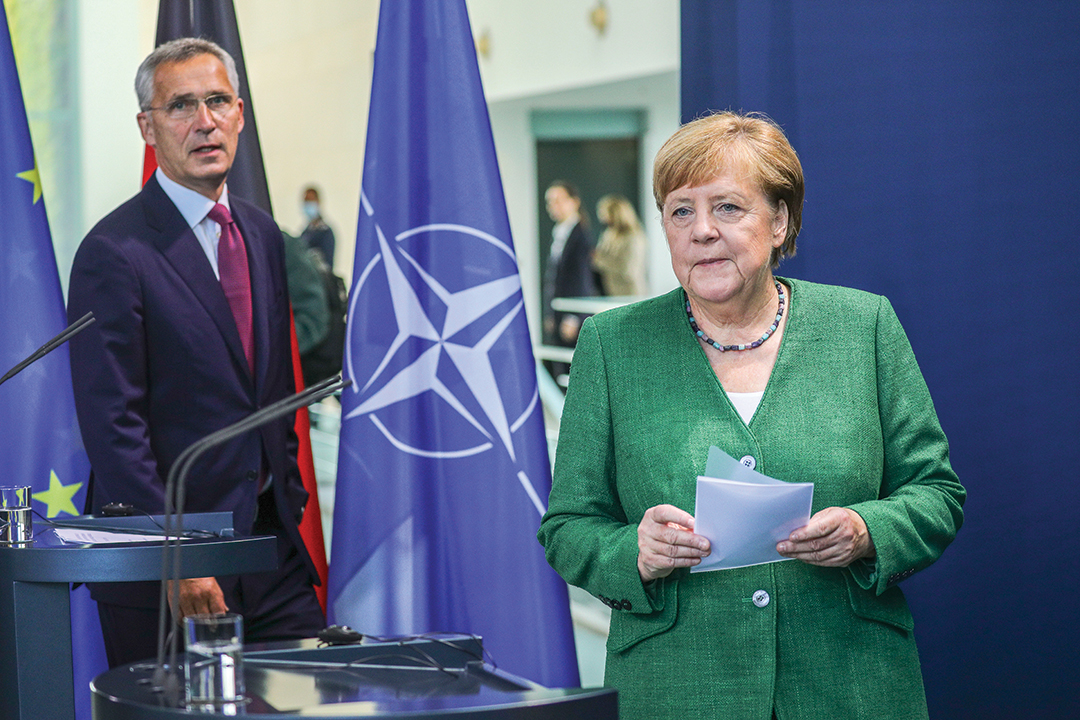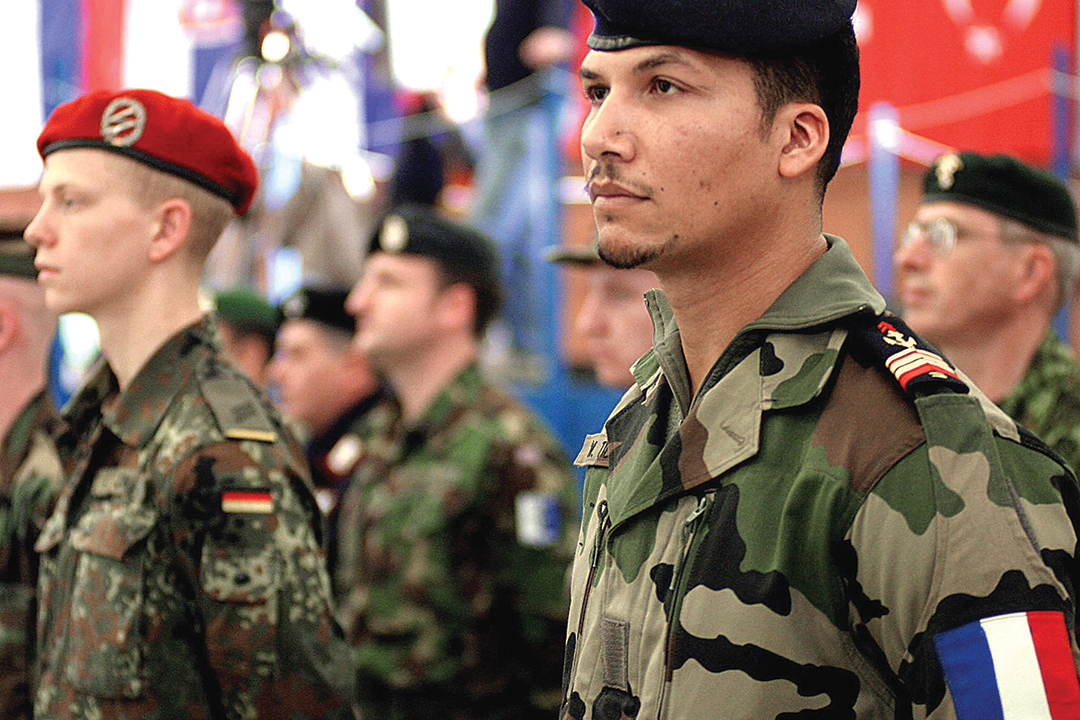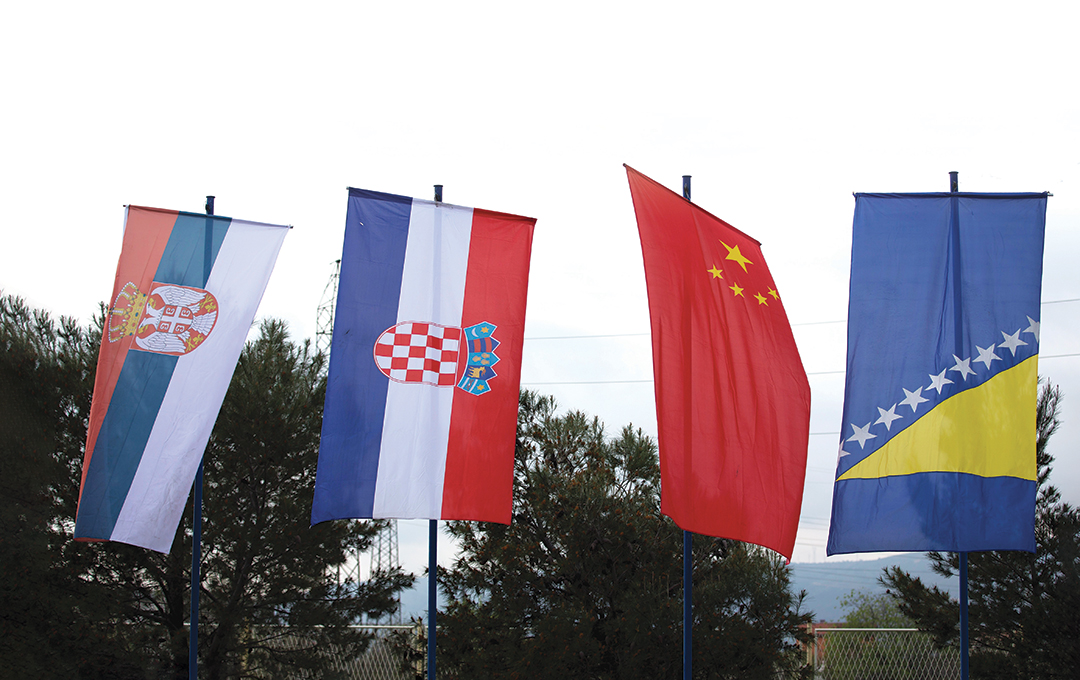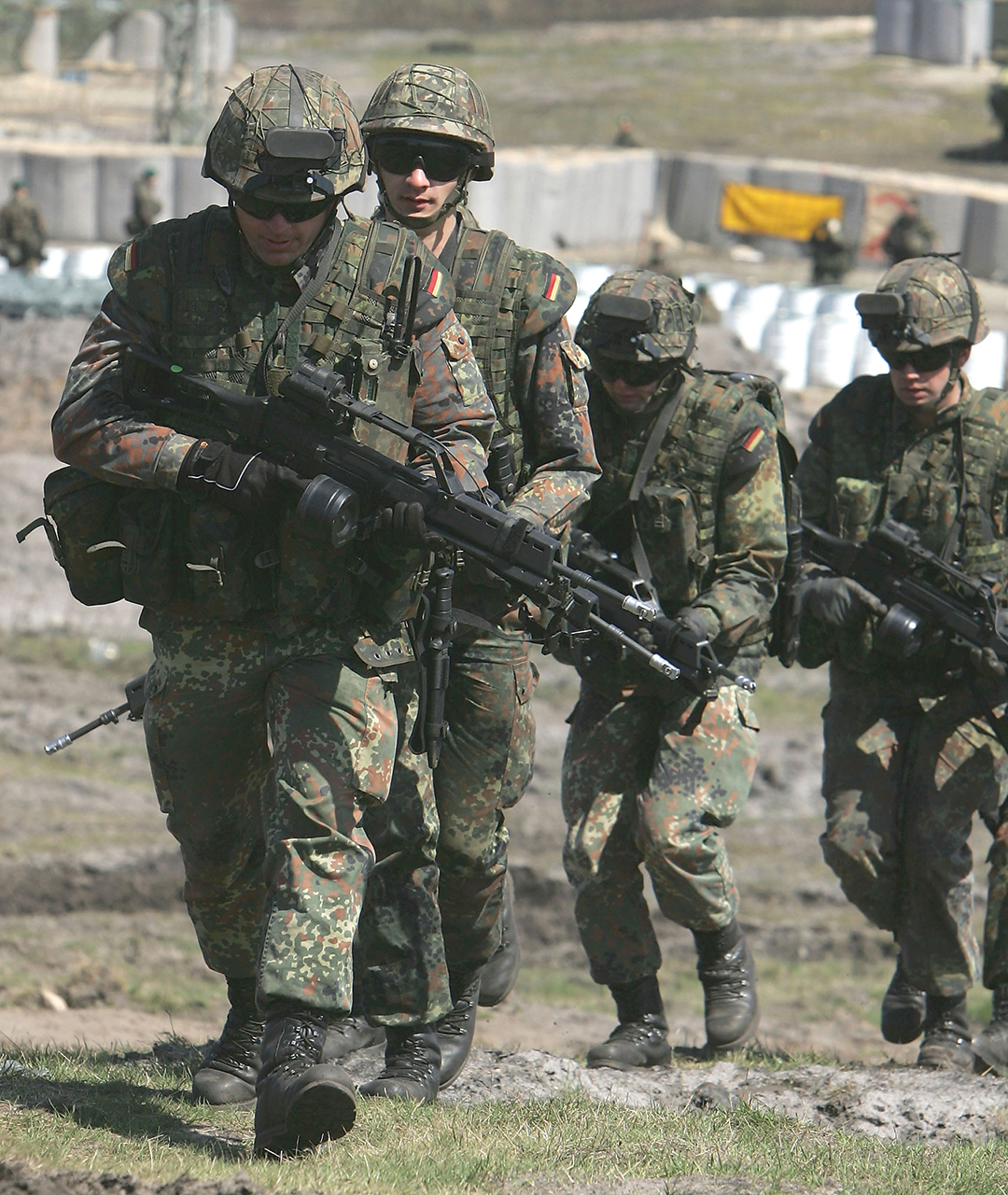Perspectives After the German Elections
By Dr. Ralf Roloff and Dr. Matthew Rhodes, Marshall Center professors
The following dialogue is adapted from the “Germany Votes” edition of the contributors’ quarterly “Transatlantic Talk” audio podcast. It was recorded September 27, 2021.
DR. MATTHEW RHODES: Ralf, the months leading up to the German parliamentary elections saw an outpouring of reflection on the legacy of Angela Merkel as chancellor after 16 years in office. Some of that commentary was sharply critical. For example, the cover of The Economist magazine that came out on the Friday before the election had the title “The Mess Merkel Leaves Behind.” There was also an opinion piece in The Wall Street Journal that concluded that Merkel’s real legacy is a weaker West. From your standpoint, what were the most important developments under Merkel for German foreign policy in general and for trans-Atlantic relations in particular?
DR. RALF ROLOFF: Thank you, Matt. Indeed, 16 years is a long time to be the head of government. Angela Merkel is certainly one of the longest serving heads of government that we have recently seen internationally as well as one of the longest serving chancellors in German history. So, her final months in office were kind of a long goodbye. From my perspective, what Merkel leaves behind in German foreign policy reflects the time that she had to go through. She will be remembered as a chancellor, if not the chancellor, of crisis management.
At least 10 of Merkel’s 16 years in the chancellery were filled with crises, whether it was the finance, the refugee or the COVID crisis, to name only three of them. Relatively early after she came into office, it was the financial and Euro crisis, then she had to deal with the Arab Spring, the exit from nuclear energy, the migration crisis, the climate crisis and the Paris Accord, Georgia and Ukraine and Russia, Brexit, and the Iran deal. All this gives you a turbulent time in terms of international relations and foreign policy. So, crisis management and the way she managed to deal with crises, that’s certainly one of the legacies for which she will be remembered.

She also had a very pragmatic sense of doing politics that I would even say was free from the kind of vanity that we usually see with leaders. She was more interested in getting problems solved, and through that she managed to strengthen Germany’s role as a dominant, if not preeminent, power in Europe, particularly within the European Union, and the Western Alliance (NATO) as well. This was not always seen in a positive way — during the Euro crisis, she became the most hated politician in some EU member countries. However, her clear, analytical, personal approach is certainly something that will remain.
Dealing with the content of most crises also meant dealing with NATO and trans-Atlantic relations. During Merkel’s 16 years as chancellor, she had to work with four very different U.S. presidents. She went through ups and downs in German-U.S. relations. She came into office at one of the lowest points during the President George W. Bush administration, after the Iraq war. She then went through the President Barack Obama time, and I still recall the nice pictures from the 2015 G7 summit near Garmisch at Schloss Elmau, which was really a G2 summit between Merkel and Obama. Then she went through the turmoil with the Donald Trump presidency during which the key U.S. ally was seen as more of a challenge. She always tried to steer through that with a clear, analytical view rather than big emotions.
What Merkel will finally leave behind as a heritage in German foreign policy is the overall multilateral approach based on fixed integration into the EU and NATO, multilateral cooperation in the context of the United Nations and the Organization for Security and Co-operation in Europe, and in particular, new forms of informal leadership through the G7, G20, the Normandy format, and other 2+X formats through which she worked behind the scenes in a very smart way. And I’m quite convinced that this kind of crisis management is something that we will miss.
So my perspective looks much more positive than The Economist’s. What’s your take, Matt, on how Merkel’s legacy is viewed in the United States?
RHODES: From my perspective as an American, there were some of the similar kinds of perceptions that you talked about. And I think most centrally, across all these different events, different crises, different presidents over 16 years, is the way that, also in the U.S., Germany became seen as the dominant power in Europe and the most important European ally of the U.S., and that Merkel personally — in part because of her longevity and some of the leadership characteristics you talked about — also became the most visible, most recognizable European leader for the general American public.
Back in the 1990s or the early years of this century, under the Bill Clinton and George W. Bush administrations, that role was still very much with Great Britain and Tony Blair. Under Merkel, you saw a clear shift, though as you said, in both a positive and negative sense. You mentioned the smiling pictures of Merkel and Obama from the Schloss Elmau G7 summit and it’s interesting, in terms of the cycle of these things, that Germany is due to take over the G7 chair position again next year. I also recall a quote from President Obama at the very end of his presidency, before boarding Air Force One for a final trip to Berlin, in which he told reporters that he considered Chancellor Merkel his most important international partner during his time in office.
Similarly, looking at U.S. President Joe Biden now, it was notable that he made time in the very first weeks after his inauguration to participate together with Merkel in the virtual Munich Security Conference and that Chancellor Merkel was also the first European leader that he invited to the White House.

But, as you already mentioned, it was very different during the four years of the Trump administration. During this time, President Trump seemed almost to go out of his way to single out Germany and Merkel personally for very negative public criticism. Even during the election campaign in 2016, one of Trump’s typical lines at rallies was that Angela Merkel was “ruining Germany” because she had let in too many migrants. Trump also called out Germany over low defense spending and what he saw as protectionist EU trade practices throughout his time in office. But if you accept the old saying that there is no such thing as bad publicity, either way, Germany and Merkel were getting a lot of attention.
We have seen that spill over in the U.S. and internationally in terms of interest in Germany’s election campaign. Again, reflecting Germany’s new prominence and a certain amount of suspense about what would happen or change after 16 years of a single leader, there has been more attention in the media and among people just talking about this election than I can remember for any others during my time at the Marshall Center. Part of the attention has been to foreign policy, including the position of some of the parties toward NATO. The leftist Die Linke party’s call for withdrawal from NATO and the Green Party’s call to reject the 2% of gross domestic product (GDP) defense spending target both fueled speculation about what a new government might bring.
Ralf, what role do you think foreign policy played in the campaign, and what do the initial results mean for European security?
ROLOFF: It’s interesting to hear that the German elections were very prominent with the U.S. media and public, which indicates the importance of Germany to the U.S. and American foreign policy. I have to admit, though, that in Germany itself, throughout the campaign, the role of foreign policy was close to zero. Foreign policy is rarely the biggest issue in campaigns, but normally at least some of the key topics are important. Four years ago, it was the migration issue, and before that we had the Euro crisis. Then everything was overshadowed by COVID and climate change. Even if you took at the so-called triad debates between the three main candidates for chancellor, it was hard to find discussion of any foreign policy issue. They did not talk beyond the margins about the EU, trans-Atlantic relations, Russia or China, which was really striking. The popular “Wahlomat” online tool to inform the electorate about parties’ platforms also only included about four questions related to foreign policy out of 40, and that gives another clear indication that this election was basically about domestic politics.
In the meantime, we don’t yet know what the results really mean. One thing that is quite obvious is that the big loser of this election was Merkel’s Christian Democratic party and its local Bavarian ally the Christian Social Union, which lost a large number of its direct mandates. On the other hand, we can see two strong winners, the Greens and the Liberals, which in terms of demography, attracted the most votes from the younger generation in a demand for change. The exact direction of the change is not quite clear, even in terms of foreign policy, but it is a demand for change.
One final remark is that all three of these parties are very critical about what we perceive as great power competition, which they see as one of the major threats to German and European security. Their way of thinking about international relations is not a traditional realist approach, focusing on power and balances of power, but rather more on the two main issues, particularly for the younger generation: climate change, for one, and digitalization and the renewal of the international economy in a way that allows the younger generation to pursue a positive future, for the other. For both, this power competition seems to stand in the way of a successful policy. It will be interesting to see how discussions with our trans-Atlantic partners turn out in terms of how to overcome great power competition without investing too much effort, time and money, at the expense of other problems.
RHODES: That’s an interesting take, especially regarding the idea of great power competition, or what the Biden administration describes in most of its documents with the slightly different phrase, “strategic competition.” This will be a key issue being watched from Washington also as the countries proceed with drafting a new Strategic Concept for NATO that responds partly to a more assertive, aggressive Russia, but especially to the rise of China as a priority for the U.S.
We had a taste of how these issues can sometimes lead to tensions in the broader trans-Atlantic field, potentially including political leaders here in Germany, with the deal just before the German elections between Australia, the United Kingdom and the U.S. to form a new strategic partnership in the Indo-Pacific and whose first major initiative was the purchase of nuclear-powered submarines by Australia, canceling an existing deal with France for diesel ones.

The view in the U.S. seems to be that the protests from France and from some EU politicians about this will not be a major stumbling block for trans-Atlantic cooperation. There have been some signs of this in the weeks just before and after the German elections. There was this kind of olive branch when the Biden administration finally announced that it would allow travel again from Europe, from the Schengen zone, into the U.S. for vaccinated travelers. There was also a make-up phone call between President Biden and President Emmanuel Macron to say, “Yes, we could have handled this better and had more consultations, but more unites us than divides us, and we’ll talk more in the months ahead.” It is also symbolic that despite initial French moves to postpone the first meeting of the new trans-Atlantic U.S.-EU Trade and Technology Council in Pittsburgh, it went ahead, with the idea that on some issues regarding the digital economy and emerging technologies, such as artificial intelligence, it’s still important for the partners to talk in a formalized framework.
Even so, there is still concern from the U.S. that domestic politics on both sides of the Atlantic will exert heavy influence on the ability of the governments to make real progress on this agenda, under whatever scenario eventually emerges for a new government in Germany. This includes influence on climate, on further progress with the COVID pandemic, and especially on some kind of common approach on China and strategic competition.
And here there are a couple of concurrent developments in the U.S. that are worth highlighting. Maybe the most immediate and most urgent, as we record this today, is the question of the U.S. Congress reaching an agreement to extend the U.S. government’s authority to continue to spend and borrow money. There were two parallel calendars for those two aspects of the budget, but both are winding down fairly quickly. If the centerpiece of the Biden foreign policy, including toward strategic competition, is the idea of proving that democracies are fit for the 21st century and able to solve 21st century problems, nothing would be more discouraging and likely to divide trans-Atlantic allies than a new economic crisis triggered by a failure on these budget and debt agreements. It is a little bit out of the headlines, but another underlying issue concerns the ability to get nominees from the Biden administration for senior foreign and security policy positions into place.
This has been much slower than in most administrations, partly because of slowness in naming nominees, but also because of blockage within the U.S. Senate in considering and voting to approve different people. There was a small step forward, also in the last week or so after the German election, in which one major figure, Karen Donfried, the outgoing president of the German Marshall Fund nongovernmental organization, was approved to be the new senior State Department official leading relations with Europe. Given her background, this will be at least someone who is very experienced in the trans-Atlantic relationship. But most ambassador nominations and others remain stuck. For supporters of the administration, there’s a complaint that this inability to put a full team in place is one of the things that is making it more difficult to coordinate on a higher level with counterparts in Europe. Career officials can certainly manage in acting capacity on an interim basis, but they lack the full credibility and authority of confirmed nominees. They perhaps lack the ability to carry out the kind of “relentless diplomacy” to solve global problems that President Biden talked about in his speech to the U.N. General Assembly. You need people in place to really make that a success.

And so, these kind of prolonged delays on the U.S. side, even nine or 10 months since the Biden administration took office, may now overlap with the government transition period in Germany. This could be shorter than some people predict, but in any case, it will take some months while coalition negotiations continue until new senior people can start to be put in place. The hope is that this kind of overlapping or successive delay does not too much hinder progress on finding formulas to address the highest priority issues, so that next year in NATO’s new Strategic Concept and the EU’s parallel Strategic Compass, there is at least a complementary approach.
Looking at some of the different scenarios that you sketched out for the new German coalition, I can also see a potential paradox. Certainly, you could imagine under some constellations, whether it’s the traffic-light or something else, in which a new German government is even closer to the current American position than was the outgoing government led by Chancellor Merkel on at least some priorities, such as China or even the approach toward democracy and human rights. However, that government could very well be less firmly grounded, either internally because it is a more diverse coalition, or internationally because it doesn’t have quite the longevity and prestige that Merkel brought within European politics. In that case, it might be closer to the U.S. position on paper but less able to deliver tangible support, either in forging some kind of consensus on issues within Europe or in terms of supporting increased military capabilities for collective defense relative to Russia or other threats. So, you could get a situation of “on the one hand, and on the other,” but it matters where this balance might lie in the new government.
ROLOFF: One of the key questions is definitely related to defense and capability building. The basic argument is that it doesn’t make sense to talk about 2% of GDP for defense without taking into account another 2% in spending for development. A more comprehensive perspective on security changes the equation.
We certainly will see these kinds of debates much more often in the future, as that is how the Greens and parts of the Social Democrats look at foreign and security policy. And that certainly might also become an interesting discussion within the U.S. Democratic Party, where I see this kind of split in views on international relations as well.
RHODES: This is certainly going to be an ongoing challenge. The U.S., Germany and other NATO members face the necessity of adapting defense in the midst of really fundamental changes in the economy, and in technology and social relationships.


Comments are closed.